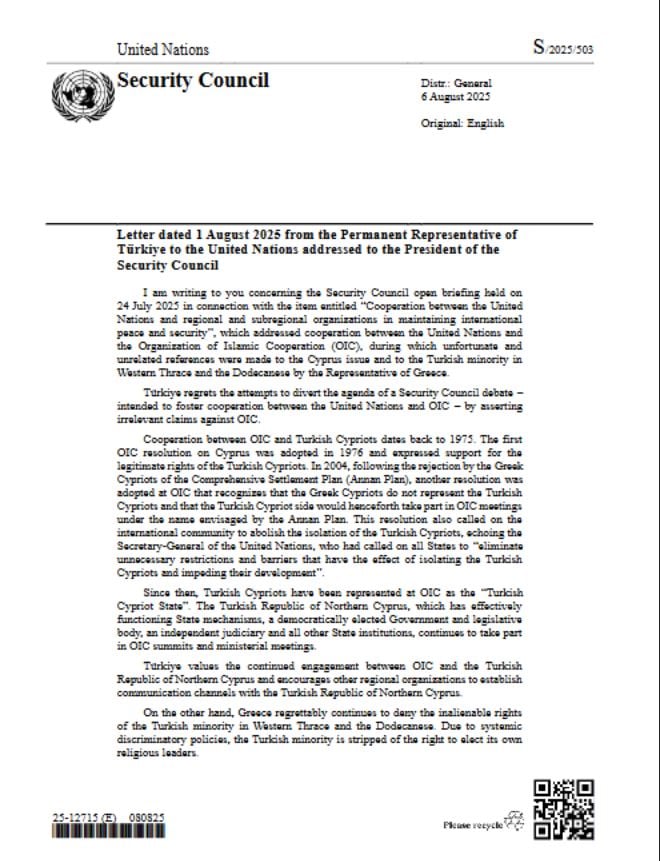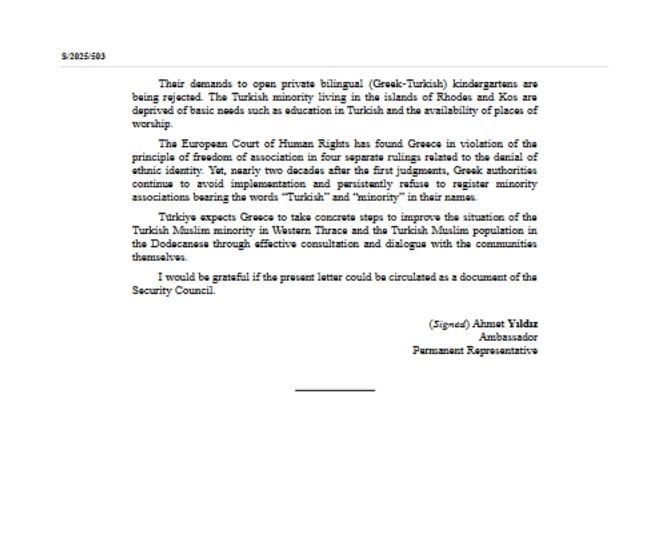Turkey has formally called for greater international engagement with the self-declared “Turkish Republic of Northern Cyprus” (TRNC) and raised allegations of discrimination against the “Turkish” minority in Western Thrace and the “Turkish Muslim population” in Greece’s Dodecanese islands, in a letter to the United Nations Security Council.
The letter, dated 1 August 2025 and published on 6 August, was sent by Turkey’s Permanent Representative to the UN, Ahmet Yildiz, in response to remarks made by Greece’s representative during an open Security Council briefing on 24 July regarding UN cooperation with regional organisations, including the Organisation of Islamic Cooperation (OIC).
Greece had expressed reservations over what it described as repeated Turkish-backed references in OIC summits to alleged violations of the rights of the “Turkish” minority in Thrace, as well as Ankara’s efforts to bypass UN Security Council resolutions by promoting the TRNC’s upgrade in status through OIC membership candidacy.
In his letter, Yildiz defended the TRNC’s participation in the OIC, arguing it has “fully functioning state mechanisms, a democratically elected government and legislature, an independent judiciary, and all other state institutions.” He also claimed Turkey values continued engagement between the OIC and the TRNC and encouraged other regional organisations to establish similar channels of communication.
The Turkish diplomat further alleged that Greece denies the “inalienable rights” of the Turkish minority in Thrace and the Dodecanese, citing restrictions on electing religious leaders, rejections of bilingual kindergarten proposals, and a lack of Turkish-language education and places of worship in Rhodes and Kos.
Yildiz also referred to four separate European Court of Human Rights rulings that found Greece in violation of freedom of association principles by refusing to recognise minority associations with “Turkish” or “minority” in their names. He said Greek authorities had failed to implement these rulings for nearly two decades.
The full text of the letter, as circulated to the UN Security Council, reads:
The Turkish letter:
“Letter dated 1 August 2025 from the Permanent Representative of Türkiye to the United Nations addressed to the President of the Security Council
I am writing to you concerning the Security Council open briefing held on 24 July 2025 in connection with the item entitled “Cooperation between the United Nations and regional and subregional organizations in maintaining international peace and security”, which addressed cooperation between the United Nations and the Organization of Islamic Cooperation (OIC), during which unfortunate and unrelated references were made to the Cyprus issue and to the Turkish minority in Western Thrace and the Dodecanese by the Representative of Greece.
Turkiye regrets the attempts to divert the agenda of a Security Council debate – intended to foster cooperation between the United Nations and OIC – by asserting irrelevant claims against OIC.
Cooperation between OIC and Turkish Cypriots dates back to 1975. The first OIC resolution on Cyprus was adopted in 1976 and expressed support for the legitimate rights of the Turkish Cypriots. In 2004, following the rejection by the Greek Cypriots of the Comprehensive Settlement Plan (Annan Plan), another resolution was adopted at OIC that recognizes that recognizes that the Greek Cypriots do not represent the Turkish Cypriots and that the Turkish Cypriot side would henceforth take part in OIC meetings under the name envisaged by the Annan Plan. This resolution also called on the international community to abolish the isolation of the Turkish Cypriots, echoing the Secretary-General of the United Nations, who had called on all States to “eliminate unnecessary restrictions and barriers that have the effect of isolating the Turkish Cypriots and impeding their development”.
Since then, Turkish Cypriots have been represented at OIC as the “Turkish Cypriot State”. The Turkish Republic of Northern Cyprus, which has effectively functioning State mechanisms, a democratically elected Government and legislative body, an independent judiciary and all other State institutions, continues to take part in OIC summits and ministerial meetings.
Turkiye values the continued engagement between OIC and the Turkish Republic of Northern Cyprus and encourages other regional organizations to establish communication channels with the Turkish Republic of Northern Cyprus.
On the other hand, Greece regrettably continues to deny the inalienable rights of the Turkish minority in Western Thrace and the Dodecanese. Due to systemic discriminatory policies, the Turkish minority is stripped of the right to elect its own religious leaders.
Their demands to open private bilingual (Greek-Turkish) kindergartens are being rejected. The Turkish minority living in the islands of Rhodes and Kos are deprived of basic needs such as education in Turkish and the availability of places of worship.
The European Court of Human Rights has found Greece in violation of the principle of freedom of association in four separate rulings related to the denial of ethnic identity. Yet, nearly two decades after the first judgments, Greek authorities continue to avoid implementation and persistently refuse to register minority associations bearing the words “Turkish” and “minority” in their names.
Turkiye expects Greece to take concrete steps to improve the situation of the Turkish Muslim minority in Western Thrace and the Turkish Muslim population in the Dodecanese through effective consultation and dialogue with the communities themselves.
I would be grateful if the present letter could be circulated as a document of the Security Council.
(Signed) Ahmet Yildiz
Ambassador
Permanent Representative”


Also read: Five key points: When Donald meets Vladimir
For more videos and updates, check out our YouTube channel.
With information from: Liberal.gr


